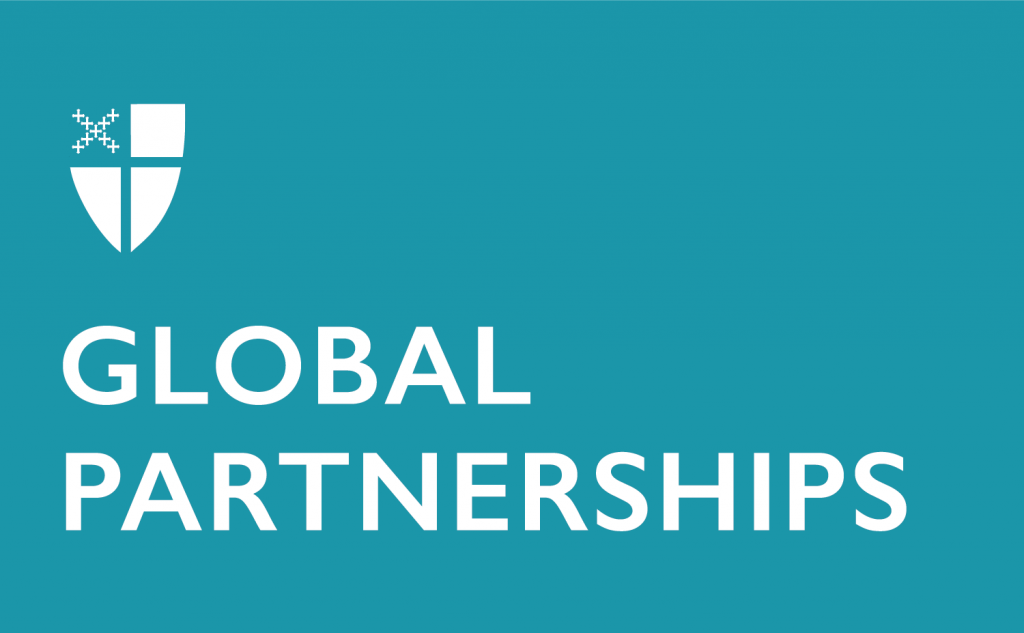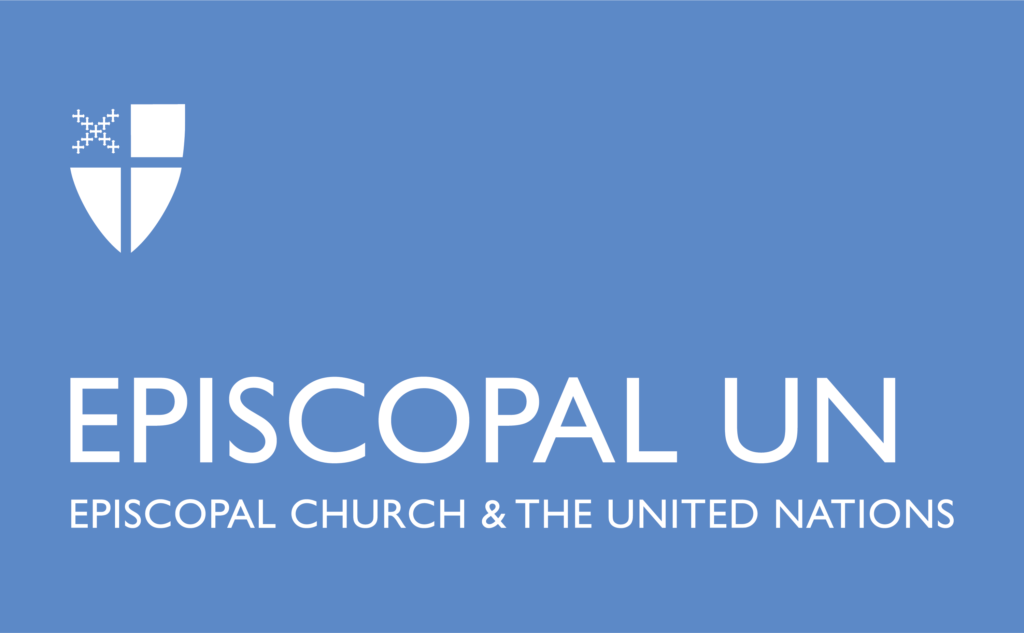Bring Us to the Table: Women in Leadership & Power
By: Tatiana Perea Hoecker, Diocese of West Texas (Province VII)
When speaking about women in leadership and decision-making roles, we often hear the phrase: Bring people to the table. This could be a physical table, a virtual table, a metaphorical table, or even the dinner table. As Episcopalians, we often speak about a welcoming table. One in which all are welcome no matter their race, ethnicity, or gender, and are invited to break bread with one another and make room for all.
The fifth United Nations (UN) Sustainable Development Goal (SDG) encompasses all aspects of reaching gender equality by 2030. One of the targets of this goal reads, “Ensure women’s full and effective participation and equal opportunities for leadership at all levels of decision-making in political, economic and public life.” Essentially, bring women to the decision-making table. The Beijing Declaration and Platform for Action written in 1995 is the most comprehensive document for advancing women’s rights in order to reach gender equality worldwide. Today, 25 years later, we celebrate and bring to light where we have improved and where we have fallen short. One area where there is still much improvement needed is women in leadership and power.
In many countries of the world, the decision-making table has only included few people, most of whom do not represent the diversity of their nations. The Prime Minister of Iceland, Katrín Jakobsdóttir said during the UN webinar on Women Leaders for Generation Equality, “[The] pandemic has shown us the need for diverse leadership.” That better decisions are made when there is a diverse group around the table. At this same event, Hajer Scarief, a Libyan human rights advocate and co-founder of Together We Build It, spoke about how if the decision-makers are a small group of mostly men, then policies will not be inclusive or address issues that don’t pertain to them. She says we need to “redesign the decision-making table”. A report published this year by UN Women entitled Progress on the Sustainable Development Goals: The gender snapshot shares data not only on the gender side of the SDGs in 2020 but how the pandemic has affected the SDGs. The report states that worldwide only a quarter of seats in national parliaments are held by women. Additionally, in 2019, women represented 39% of the world’s workers, but only occupied 28% of managerial positions. And finally, only 6.7% of the world’s heads of government are women.
The news gets worse. According to a new study released by Women Deliver, as part of Generation Equality’s campaign to engage governments and the private sector, “Progress needs to accelerate by nearly two times to ensure women are equally represented in the key political positions by 2030. More than 650 million girls and women in 64 countries have never had an elected or appointed female head of state or government.”
If there were ever a time to redesign the decision-making table now, in the middle of a pandemic, is the time.
One woman who plays a key part in this discussion is Dr. Alaa Murabit. She is a Libyan-Canadian physician, an SDGs Global Advocate, and a UN High-Level Commissioner on Health, Employment, and Economic Growth. In her TEDWomen talk in 2015 entitled What my religion really says about women, she describes a moment when she was living in Libya during the 2011 revolution. That for the first time it was acceptable and even encouraged for women to have a seat at the table. However, after a few weeks, many of these women resumed their previous roles and left the table as they were driven away by religious and political leaders who cited scripture as their defense. So, Dr. Murabit decided to turn the tables. In 2012 and 2013 she led the single largest and most widespread women’s rights campaign in Libya by quoting the Quran. This movement provided an alternative narrative which promoted the rights of women in Libya and this model has been replicated internationally. Dr. Murabit so eloquently states, “I remain a very strong believer that women’s rights and religion are not mutually exclusive. But we have to be at the table. We have to stop giving up our position, because by remaining silent, we allow for the continued persecution and abuse of women worldwide.”
When I hear that last sentence, I am reminded again of why being a part of the Presiding Bishop’s delegation to UNCSW 64 is so important. It is crucial that faith-based organizations continue to work with the UN and for the UN to in turn bring them to the table.
On September 16, 2020, Presiding Bishop Curry shared a Word to the Church called “What Did Jesus Do?” He speaks about changing the question we have heard many times of what would Jesus do to what did Jesus do? Bishop Curry states: “I want to suggest that addressing that question, “What did Jesus do?” and summoning the Spirit to help us apply it to our lives and to our times may mean the difference between the church simply being another religious institution that exists for its own sake and the church being a Jesus movement that courageously follows the way of Jesus and his love, not for its sake, but for the sake of the world that Christ gave his life for and rose from the dead in.” This simple shift changes the whole narrative. It is not unlike what Dr. Murabit did when she decided to create an alternative narrative to inspire people to action.
Taking a page from Bishop Curry and Dr. Murabit’s movement, let us consider the summation of God’s law: “You shall love the Lord, your God, with all your heart, soul, mind, and strength, and love your neighbor as yourself.” God does not specify who your neighbor is on purpose. Your neighbor is every single person whether they are actually your physical neighbor or someone across the globe. This means your neighbor includes women. We don’t have to ask, “what would Jesus do?” He brought women, and other marginalized people, to the table.
So, what is your call to action right now? How can the table be reinvented in the middle of a pandemic? If you are able to, make a plan to vote in the U.S. 2020 Presidential Election. Voting is a privilege and the best way to have your voice heard. In the last published writing by John Lewis he wrote, “The vote is the most powerful nonviolent change agent that you have in a democratic society.”
At the end of Bishop Curry’s sermon, he shares the words from an old spiritual sung by slaves of antebellum America: “We’re going to eat at the welcoming table one of these days.”
It is all the same table; a table where we break bread and make decisions together. So, the question remains: who will you bring to the table?
____________________

About the author: After completing her Master’s in International Development in Barcelona, Spain, Tatiana worked for the World Mission Department for the Diocese of West Texas before working as a Consultant for Global Partnerships with The Episcopal Church. Tatiana’s interest in the United Nations began in high school when she participated in Model UN and since then has dedicated her studies to advocating for the 2030 Agenda for Sustainable Development. Tatiana has been involved in mission work for the past 13 years in Latin America. She is a Latina from Texas and for the past two years has been involved with the Episcopal Borderland Ministry assisting refugees and asylum-seeking families.
Tráenos a la mesa: Mujeres en liderazgo y poder
By: Tatiana Perea Hoecker, Diócesis del Oeste de Texas (Provincia VII)
Cuando hablamos de mujeres en roles de liderazgo y toma de decisiones, a menudo escuchamos la frase: Traiga personas a la mesa. Esta podría ser una mesa física, una mesa virtual, una mesa metafórica o incluso la mesa del comedor. Como episcopales, a menudo hablamos de una mesa de bienvenida. Uno en el que todos son bienvenidos sin importar su raza, etnia o género, y se les invita a compartir el pan y hacer lugar para todos.
El quinto Objetivo de Desarrollo Sostenible (ODS) de las Naciones Unidas (ONU) abarca todos los aspectos para alcanzar la igualdad de género para 2030. Uno de los objetivos de este objetivo dice: “Garantizar la participación plena y efectiva de las mujeres y la igualdad de oportunidades de liderazgo en todos los niveles de decisión haciendo en la vida política, económica y pública ”. Básicamente, lleve a las mujeres a la mesa de toma de decisiones. La Declaración y Plataforma de Acción de Beijing redactadas en 1995 es el documento más completo para promover los derechos de la mujer a fin de alcanzar la igualdad de género en todo el mundo. Hoy, 25 años después, celebramos y sacamos a la luz dónde hemos mejorado y dónde nos hemos quedado cortos. Un área en la que aún se necesitan muchas mejoras es la de las mujeres en el liderazgo y el poder.
En muchos países del mundo, la mesa de toma de decisiones solo ha incluido a pocas personas, la mayoría de las cuales no representan la diversidad de sus naciones. La Primera Ministra de Islandia, Katrín Jakobsdóttir, dijo durante el seminario web de la ONU sobre Mujeres Líderes por la Igualdad de Generación: “[La] pandemia nos ha mostrado la necesidad de un liderazgo diverso”. Que se toman mejores decisiones cuando hay un grupo diverso alrededor de la mesa. En este mismo evento, Hajer Scarief, un defensor de los derechos humanos libio y cofundador de Together We Build It, habló sobre cómo si los tomadores de decisiones son un pequeño grupo de hombres en su mayoría, las políticas no serán inclusivas ni abordarán problemas que no no les pertenece. Ella dice que tenemos que “rediseñar la mesa de toma de decisiones”. Un informe publicado este año por ONU Mujeres titulado Progreso en los Objetivos de Desarrollo Sostenible: la instantánea de género comparte datos no solo sobre el lado de género de los ODS en 2020, sino también sobre cómo la pandemia ha afectado a los ODS. El informe afirma que en todo el mundo sólo una cuarta parte de los escaños de los parlamentos nacionales están ocupados por mujeres. Además, en 2019, las mujeres representaron el 39% de los trabajadores del mundo, pero solo ocuparon el 28% de los puestos directivos. Y finalmente, solo el 6,7% de los jefes de gobierno del mundo son mujeres.
La noticia empeora. Según un nuevo estudio publicado por Women Deliver, como parte de la campaña Generation Equality para involucrar a los gobiernos y al sector privado, “el progreso debe acelerarse casi dos veces para garantizar que las mujeres estén igualmente representadas en los puestos políticos clave para 2030. Más de 650 millones de niñas y mujeres en 64 países nunca han tenido una jefa de estado o de gobierno elegida o nombrada ”.
Si alguna vez hubo un momento para rediseñar la mesa de toma de decisiones, ahora, en medio de una pandemia, es el momento.
Una mujer que juega un papel clave en esta discusión es la Dra. Alaa Murabit. Es médica libio-canadiense, defensora mundial de los ODS y comisionada de alto nivel de las Naciones Unidas sobre salud, empleo y crecimiento económico. En su charla TEDWomen de 2015 titulada Lo que realmente dice mi religión sobre las mujeres, describe un momento en el que vivía en Libia durante la revolución de 2011. Que por primera vez era aceptable e incluso alentado que las mujeres se sentaran a la mesa. Sin embargo, después de unas semanas, muchas de estas mujeres reanudaron sus funciones anteriores y dejaron la mesa cuando fueron expulsadas por líderes religiosos y políticos que citaron las Escrituras como su defensa. Entonces, el Dr. Murabit decidió cambiar las tornas. En 2012 y 2013, dirigió la campaña por los derechos de la mujer más grande y extendida en Libia citando el Corán. Este movimiento proporcionó una narrativa alternativa que promovió los derechos de las mujeres en Libia y este modelo ha sido replicado internacionalmente. El Dr. Murabit afirma con tanta elocuencia: “Sigo siendo un firme creyente de que los derechos de la mujer y la religión no son mutuamente excluyentes. Pero tenemos que estar en la mesa. Tenemos que dejar de renunciar a nuestro cargo, porque al permanecer en silencio, permitimos la persecución y el abuso continuo de las mujeres en todo el mundo ”.
Cuando escucho la última oración, recuerdo nuevamente por qué es tan importante ser parte de la delegación del Obispo Presidente en la UNCSW 64. Es fundamental que las organizaciones religiosas continúen trabajando con la ONU y que la ONU, a su vez, las lleve a la mesa.
El 16 de septiembre de 2020, el obispo presidente Curry compartió una palabra a la Iglesia llamada “¿Qué hizo Jesús?” Habla de cambiar la pregunta que hemos escuchado muchas veces de qué haría Jesús con lo que hizo Jesús. El obispo Curry afirma: “Quiero sugerir que al abordar esa pregunta,” ¿Qué hizo Jesús? ” y convocar al Espíritu para que nos ayude a aplicarlo a nuestras vidas y a nuestro tiempo puede significar la diferencia entre la iglesia simplemente siendo otra institución religiosa que existe por sí misma y la iglesia es un movimiento de Jesús que sigue con valentía el camino de Jesús y su amor, no por él, sino por el mundo por el que Cristo dio su vida y en el que resucitó de entre los muertos “. Este simple cambio cambia toda la narrativa. No es diferente de lo que hizo la Dra. Murabit cuando decidió crear una narrativa alternativa para inspirar a la gente a actuar.
Tomando una página del movimiento del obispo Curry y del Dr. Murabit, consideremos el resumen de la ley de Dios: “Amarás al Señor, tu Dios, con todo tu corazón, alma, mente y fuerzas, y amarás a tu prójimo como a ti mismo. ” Dios no especifica quién es tu prójimo a propósito. Su vecino es cada persona, ya sea en realidad su vecino físico o alguien en todo el mundo. Esto significa que su vecino incluye mujeres. No tenemos que preguntarnos: “¿Qué haría Jesús?” Trajo mujeres y otras personas marginadas a la mesa.
Entonces, ¿cuál es su llamado a la acción en este momento? ¿Cómo se puede reinventar la mesa en medio de una pandemia? Si puede, haga un plan para votar en las elecciones presidenciales de EE. UU. 2020. Votar es un privilegio y la mejor manera de hacer oír su voz. En el último escrito publicado por John Lewis, escribió: “El voto es el agente de cambio no violento más poderoso que existe en una sociedad democrática”.
Al final del sermón del obispo Curry, comparte las palabras de un antiguo espiritual cantado por esclavos de la América anterior a la guerra: “Vamos a comer en la mesa de bienvenida uno de estos días”.
Todo es la misma mesa; una mesa donde partimos el pan y tomamos decisiones juntos. Entonces, la pregunta sigue siendo: ¿a quién traerás a la mesa?
_________________

Sobre la autora: Después de completar su Maestría en Desarrollo Internacional en Barcelona, España, Tatiana trabajó para el Departamento de Misión Mundial de la Diócesis del Oeste de Texas antes de trabajar como Consultora para Asociaciones Globales con La Iglesia Episcopal. El interés de Tatiana en las Naciones Unidas comenzó en la escuela secundaria cuando participó en el Modelo de las Naciones Unidas y desde entonces ha dedicado sus estudios a abogar por la Agenda 2030 para el Desarrollo Sostenible. Tatiana ha estado involucrada en el trabajo misionero durante los últimos 13 años en América Latina. Ella es latina de Texas y durante los últimos dos años ha estado involucrada con el Ministerio Episcopal Fronterizo para ayudar a las familias que buscan asilo.


